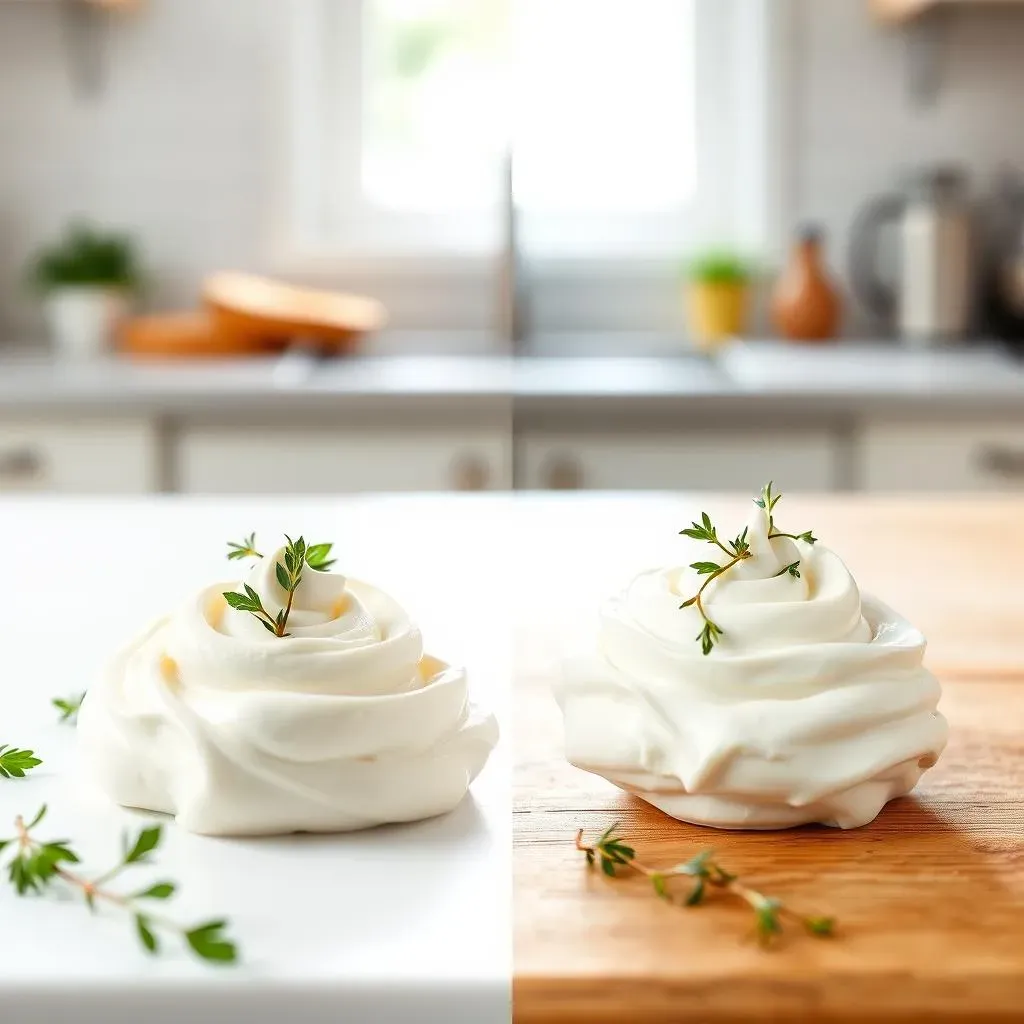Table of Contents
Ever stared blankly at a recipe, wondering if you can swap one ingredient for another? Today's culinary conundrum: can sour cream replace Greek yogurt? It's a question that pops up more often than you'd think, especially when you're short on ingredients or looking for a healthier alternative. This article is your ultimate guide to answering the burning question: "can sour cream replace Greek yogurt?" We'll explore the nuances of taste and texture, comparing these two creamy contenders head-to-head. We'll dive into the specifics of baking, where the moisture content and tanginess of each ingredient can drastically affect the outcome. And, we'll tackle savory dishes, where the creamy richness of sour cream might be a game-changer compared to the slightly tart nature of Greek yogurt. Get ready to uncover the secrets to successful substitutions, avoiding disastrous kitchen mishaps. Prepare to become a master of ingredient swaps!
Sour Cream vs. Greek Yogurt: A Taste Test

Sour Cream vs. Greek Yogurt: A Taste Test
The Tang Factor
Let's talk tang! Sour cream boasts a noticeably sharper, more acidic bite. Think of it as the sassy friend who always speaks their mind. Greek yogurt, on the other hand, has a milder, more subtle tang. It's the quiet, contemplative friend, happy to blend in. This difference in acidity is key when choosing a substitute – a dish requiring a strong tang might not fare well with the gentler Greek yogurt. For instance, if you're making a creamy taco topping, sour cream's punchier flavor might be preferred. But for a smoother dip, perhaps a tzatziki sauce (learn more about tzatziki substitutes), the milder Greek yogurt could be a better choice.
Consider the richness too. Sour cream has a higher fat content, which contributes to its luscious creaminess. It's like a rich, velvety chocolate cake. Greek yogurt, being strained, is naturally thicker but can still be thinner than sour cream depending on the brand. This could affect the texture of your final dish. For example, if you’re using sour cream in a creamy soup recipe, the higher fat content contributes to a richer, thicker texture. Swapping in Greek yogurt might result in a slightly thinner consistency. If you're aiming for a thicker consistency in your soup, you can always try straining the Greek yogurt before using it as a substitute.
Characteristic | Sour Cream | Greek Yogurt |
|---|---|---|
Tanginess | High | Low to Medium |
Fat Content | High | Medium (varies by brand) |
Texture | Thick and Creamy | Thick (can vary) |
Sweet and Savory Applications
The best choice depends heavily on whether you’re using it in a sweet or savory dish. Sour cream's higher fat content and sharper tang make it an excellent choice for savory dishes like chili or dips. It can add a lovely richness to baked goods, but its pronounced tang might overpower delicate flavors in desserts. Greek yogurt, with its milder tang and versatility, works beautifully in both sweet and savory applications. Think of it as the culinary chameleon! You can use it in smoothies, dips, or even as a healthier alternative in baking recipes that call for sour cream (check out more baking substitutes here).
Think about a simple recipe for pancakes. Using sour cream would give them a richer flavor and a slightly tangier taste. Greek yogurt would make them lighter and a bit less tangy. The choice depends on your preference! If you're looking for a healthier option in your baking, Greek yogurt is a fantastic choice. It offers a similar creamy texture without the added fat and calories of sour cream. However, remember that its slightly thinner consistency might affect the final texture of your baked goods. You might need to adjust other ingredients in the recipe to compensate for the difference.
- Sour cream: Ideal for savory dishes and richer baked goods
- Greek yogurt: Versatile for both sweet and savory applications
Beyond the Basics: Flavor Profiles
Let's not forget that plain Greek yogurt and sour cream are just starting points. Flavored varieties introduce another layer of complexity. Sour cream often comes in a limited range of flavors (maybe a little onion or chive), while Greek yogurt offers a vast world of possibilities, from vanilla and strawberry to mango and even coconut. These flavor variations can significantly impact the overall taste of your recipe. For example, if you're using sour cream in a potato salad, the plain version would offer a neutral background flavor, letting the other ingredients shine. However, choosing a flavored Greek yogurt could significantly alter the taste of the final product, potentially overpowering the other flavors.
Ultimately, the best way to decide is to experiment. Start with small substitutions. Taste as you go. Don't be afraid to adjust seasonings and other ingredients to compensate for any differences in flavor or texture. Remember, cooking is a journey of discovery, and sometimes the most exciting results come from unexpected ingredient swaps. If you're ever unsure about a substitution, always check out our other articles on dairy alternatives (find more dairy substitutes here). Happy cooking!
Texture Troubles: How Consistency Matters

Texture Troubles: How Consistency Matters
Texture is everything, right? Sour cream's got that thick, luscious, almost-too-good-to-be-true creaminess. It's like a cloud of deliciousness you just want to spoon straight from the container. Greek yogurt, while thick, can vary wildly depending on the brand. Some brands are wonderfully thick and creamy, almost rivaling sour cream; others are thinner, more like a pourable yogurt. This difference in consistency can be a major factor when substituting one for the other. Imagine making a topping for your baked potatoes – you want that luxurious, dollop-able sour cream texture, not something runny.
Think about making a creamy pasta sauce. Sour cream provides that velvety smooth consistency that coats the pasta perfectly. Using Greek yogurt might result in a thinner, slightly less luscious sauce, unless you're careful to choose a very thick brand. If you're using a thinner Greek yogurt, you might need to thicken the sauce with a little cornstarch or flour to achieve the desired consistency. This is where experimentation comes in handy! Don't be afraid to make adjustments to get the perfect texture you're looking for. And remember, sometimes a slightly thinner consistency can be just as delicious! Perhaps you prefer a lighter, less heavy pasta sauce? If so, Greek yogurt might just be your new favorite ingredient!
Ingredient | Consistency | Ideal Uses |
|---|---|---|
Sour Cream | Thick, Creamy | Toppings, dips, rich sauces |
Greek Yogurt | Thick to Medium (varies) | Smoothies, lighter sauces, baking (with adjustments) |
Let's say you're making a cheesecake. The creamy texture of the filling is crucial for a successful outcome. Sour cream’s richness contributes to a dense, decadent filling. Using Greek yogurt might result in a lighter, potentially less rich cheesecake. Again, you can compensate by thickening the yogurt with a little cream cheese or by choosing an especially thick brand of Greek yogurt. This is also true for other baked goods, like muffins or cakes, where the right consistency is essential. For example, replacing sour cream with a thin Greek yogurt in a muffin recipe could lead to dry, crumbly muffins. To remedy this, you could add a little extra moisture by increasing the amount of liquid in the recipe or adding a binding agent like eggs.
Ultimately, understanding the consistency differences between sour cream and Greek yogurt is crucial for successful substitutions. It’s not just about flavor; it’s about achieving the desired texture in your dish. Remember to always consider the specific recipe and the desired outcome before making a swap. You can find more tips on ingredient substitutions in our other articles, like this one on substituting sour cream for heavy cream!
- Check the brand: Greek yogurt thickness varies significantly.
- Consider thickening agents: Cornstarch, flour, or cream cheese can help.
- Experiment: Small substitutions are your friend!
Baking Battles: Sour Cream in the Oven

Baking Battles: Sour Cream in the Oven
Ah, baking—the realm of precise measurements and delicate balances! Sour cream, with its high fat content and tangy flavor, plays a significant role in many baked goods, contributing to moisture, tenderness, and a delightful tang. But can Greek yogurt step in and fill those creamy shoes? It’s a trickier question than you might think! The high fat content of sour cream is key to its success in baking; it creates a moist, tender crumb. Greek yogurt, while thick, often has a lower fat content, which can result in drier baked goods. For example, substituting Greek yogurt for sour cream in a cake recipe might lead to a cake that's a bit dry and crumbly. To counteract this, you might need to add extra moisture to your recipe, perhaps by increasing the amount of milk or oil. You could also add extra eggs, as their binding properties will help counteract the lower fat content of the Greek yogurt. Think of the eggs as the glue holding everything together! But, be warned, too much extra moisture can lead to a soggy mess, so a little trial-and-error might be necessary.
Ingredient | Fat Content | Impact on Baking |
|---|---|---|
Sour Cream | High | Moist, tender crumb |
Greek Yogurt | Lower (varies) | Potentially drier, crumblier result |
Let's consider muffins. Sour cream adds richness and moisture, resulting in those perfectly tender, slightly tangy muffins we all crave. Swapping in Greek yogurt might yield muffins that are a little drier, though perhaps a bit healthier. To achieve a similar result, you could try using a full-fat Greek yogurt and adding a tablespoon or two of melted butter to the recipe. This will help to add some extra richness and moisture. Alternatively, you could reduce the amount of other liquids in the recipe, such as milk, to compensate for the added moisture from the Greek yogurt. Remember, the key is to balance the moisture and fat content in your recipe. This also applies to other baked goods, such as cakes, cookies, and quick breads where the right balance is crucial. For more in-depth information on baking substitutions, check out our guide on substituting buttermilk for sour cream in baking.
- Use full-fat Greek yogurt for best results.
- Adjust other liquids (milk, oil) accordingly.
- Consider adding extra eggs or melted butter.
The tang factor also comes into play. Sour cream's pronounced tanginess can be a delicious element in some baked goods, providing a lovely contrast to sweeter flavors. However, in recipes where the flavors are more delicate, sour cream's strong tang might overpower other ingredients. Greek yogurt, with its milder tang, often works better in these situations. For instance, in a delicate lemon cake, the subtle tang of Greek yogurt complements the lemon flavor without overpowering it, while sour cream might clash with the other flavors and make the cake taste too tart. Similarly, in recipes where you are using other tart ingredients, such as buttermilk or lemon juice, a milder yogurt might be the better choice. The use of sour cream, in this instance, could result in a recipe that is too tart and unappealing. Always consider how the sour cream’s tanginess will interact with the other flavors in your recipe.
Savory Situations: Sour Cream in Main Dishes

Savory Situations: Sour Cream in Main Dishes
Now we're talking about the real power plays – savory dishes! Sour cream, with its rich, tangy flavor and thick consistency, is a star in countless savory recipes. Think creamy soups, decadent dips, and those lusciously smooth sauces that elevate a simple dish to something truly special. Its high fat content contributes to a velvety texture, coating your palate with deliciousness. But can Greek yogurt pull off the same magic? It can, but with a few caveats. Greek yogurt's milder tang and often thinner consistency can mean a slightly different outcome. For instance, in a creamy tomato soup, sour cream adds a luxurious richness that Greek yogurt might not quite match. However, if you want a lighter, less decadent soup, Greek yogurt is a good choice. You might need to add a thickening agent like cornstarch to reach the desired consistency. For a richer flavor, consider adding a touch of cream cheese or even a dollop of sour cream to boost the richness.
Dish | Sour Cream | Greek Yogurt |
|---|---|---|
Creamy Tomato Soup | Rich, velvety texture | Lighter, may need thickening |
Chicken Enchilada Sauce | Adds richness and tang | Milder flavor, may need adjustment |
Potato Salad | Creamy, tangy base | Lighter, potentially less rich |
Let's talk about stroganoff. The classic recipe relies on sour cream for its signature creamy texture and tang. While Greek yogurt can be used as a substitute (check out more stroganoff tips), you might find the final dish slightly less rich and tangy. To compensate, you might want to increase the amount of beef broth or add a touch of lemon juice for extra tang. Alternatively, you could blend in a little sour cream with the Greek yogurt for a happy medium. This ensures you retain some of the richness and tanginess that sour cream provides while still reaping the benefits of using Greek yogurt. Remember, experimentation is key! Don't be afraid to adjust seasoning and other ingredients to achieve your desired flavor profile.
Consider a creamy potato salad. Sour cream creates a rich, tangy base that perfectly complements the potatoes. Using Greek yogurt might result in a lighter, less tangy salad. To compensate, you might add a touch of Dijon mustard or apple cider vinegar to enhance the flavor. You might also want to use a full-fat Greek yogurt to ensure it’s thick enough to create the creamy texture you're after. If you find the salad still lacks richness, you could always add a tablespoon or two of mayonnaise to achieve that creamy texture without compromising the health benefits of using Greek yogurt. For more tips on healthy substitutes, check out our article on substituting mayonnaise for sour cream.
- Adjust seasonings: Add lemon juice, vinegar, or mustard for extra tang.
- Use full-fat Greek yogurt: For a thicker consistency.
- Consider blending: Mix Greek yogurt with a small amount of sour cream.